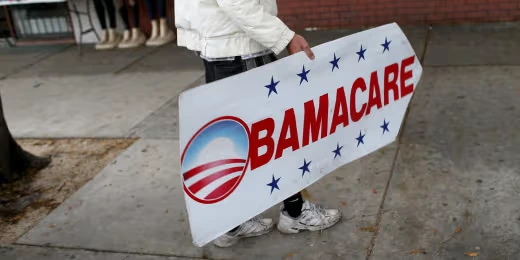Republicans Divided Over Extending Obamacare Premium Tax Credits as Coverage Costs Surge
By Roy J. Miles

Republicans in Congress are confronting a deeply fraught debate over whether to extend the enhanced Affordable Care Act (ACA) premium tax credits that helped more than 24 million Americans afford health insurance. The credits, introduced through the American Rescue Plan and extended by the Inflation Reduction Act, are scheduled to expire at the end of 2025 unless lawmakers act. As coverage disruptions loom, GOP lawmakers are sharply divided on the political, fiscal, and ideological implications.As the expiration deadline draws near, health insurers are submitting projected rate filings that include their largest projected premium hikes in almost seven years. A median increase of 15% is expected in 2026, with some plans seeking at least 20% increases. Without congressional action to extend the ACA subsidies, average premiums are forecast to rise by as much as 75%, especially affecting middle-income families who previously benefited from the expanded eligibility rules. States like Texas and Florida, where ACA enrollment surged post-2021 expansion, could see sharp spikes in uninsured rates if credits vanish. In Texas alone, up to 1.7 million people could lose health coverage, with marketplace enrollment plummeting and financial strain hitting hospitals and consumers alike :.Internally, Republicans are wrestling with conflicting political pressures. Some conservative voices—Senators like Thom Tillis (NC), Josh Hawley (MO), and Alaska’s Dan Sullivan and Lisa Murkowski—have pushed for bipartisan talks that could include extending the premium credits. They emphasize the risk of destabilizing health markets and alienating swing‑district voters ahead of the midterms. According to Punchbowl News and Politico coverage, these senators view the debate as an opportunity to hold a bipartisan approach rather than rely on partisan reconciliation maneuvers :.Other Republicans resist, arguing that extending a Biden-era affordability program financed through deficit spending undermines the emerging Trump tax agenda. The reconciliation bill—dubbed the “One Big Beautiful Bill”—passed narrowly in the Senate and cuts approximately $880 billion from Medicaid while making Trump-era tax cuts permanent. It does not include ACA subsidy extensions. GOP leadership, including Speaker Mike Johnson and House Ways and Means Chair Jason Smith, have yet to commit to addressing the enhanced credits, which critics argue represent a disproportionate benefit to middle- and upper-income taxpayers :.Democrats, for their part, have made extending the ACA premium credits a condition of any bipartisan health care package. Leaders including Representative Richard Neal and Senator Ron Wyden have tied cooperation on drug pricing reforms and Medicare changes to the inclusion of a permanent extension of premium tax credits—estimated to cost $383 billion over a decade. Without an extension, Democrats warn of steep economic consequences for working‑ and middle‑class families :.Polling data from KFF shows general public support across party lines. About 77% of adults—including 63% of Republicans and 72% of MAGA supporters—say Congress should extend the ACA tax credits. Even when informed that extending them increases the deficit, support remains in the majority. Awareness of the expiring credits is low—most Americans say they’ve heard little about them—but support rises sharply when they learn that premiums would jump or coverage would be lost if subsidies vanish :.Economic and policy analysts caution that expiration of the enhanced credits would exacerbate inequities. Without them, families making over 400% of the federal poverty level—previously included in subsidy eligibility for the first time—could see household premium costs triple. Small business owners, rural residents, and older adults approaching retirement would be disproportionately affected. Analysis from KFF and the Center for American Progress warns that overall uninsurance may increase by 4–11 million people in coming years, and premiums could surge by thousands annually depending on state and income level :.The debate also ties into broader Republican health policy: the same reconciliation bill includes major cuts to Medicaid and welfare programs. Critics argue it will hollow out the social safety net, disproportionately harming low-income and rural communities. An estimated 10–11 million people could lose coverage overall. Republican leaders justify the changes as measures of accountability and fiscal stewardship, while opponents see it as ideological rollback of health access. In Texas, KFF projects 560,000 Texans might lose ACA coverage alone due to the combined effects of policy changes—magnifying the urgency of subsidy debate :.At the legislative level, discussions are underway. Senate Finance Committee Chair Mike Crapo has floated reforms to pharmacy benefit managers (PBMs) and drug access issues as potential bipartisan areas. Still, key GOP negotiators avoid endorsement of extending the ACA credits. Meanwhile, Democrats remain firm: no extension, no deal. Outlook observers note that a partisan reconciliation route might bypass ACA credit extension entirely—fueling criticism that Republicans favor wealthy tax cuts while undermining health coverage for working Americans :.If Congress does nothing, many experts expect chaotic marketplace dynamics. Insurers anticipate widespread exit from ACA exchanges due to unprofitable enrollee risk pools and regulatory burdens. Open enrollment would be shortened; eligibility verification tightened; and data suggests as many as 4 million Americans could lose coverage by 2027. Rural hospitals and low-income communities, particularly in non‑Medicaid expansion states, may face service gaps and financial strain :.As the legislative calendar progresses, policymakers face a high-stakes political and fiscal balancing act: support a subsidy viewed by many Republicans as emblematic of Democratic policy, or risk mass premium hikes, uninsured increases, and backlash in critical swing districts. The outcome may hinge on whether bipartisan consensus emerges or whether fiscal orthodoxy and ideological barriers prevail.In sum, the premium credit debate encapsulates broader tensions: Republican loyalty to tax cut priorities vs. political pragmatism to shield constituents from health care disruption; budgetary restraint arguments vs. concerns about affordability and coverage losses; ideological resistance vs. the electoral and human cost of letting ACA subsidies expire. The resolution—or failure—of this fight may define health care politics and voter sentiment heading into the 2026 midterms.